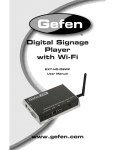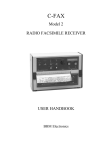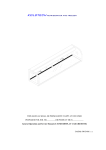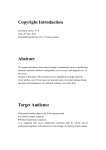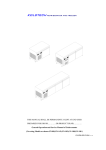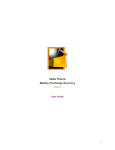Download Manual - Gefen
Transcript
Digital Signage Player with Wi-Fi EXT-HD-DSWFN User Manual Release A3 Digital Signage Player with Wi-Fi Important Safety Instructions GENERAL SAFETY INFORMATION 1. Read these instructions. 2. Keep these instructions. 3. Heed all warnings. 4. Follow all instructions. 5. Do not use this product near water. 6. Clean only with a dry cloth. 7. Do not block any ventilation openings. Install in accordance with the manufacturer’s instructions. 8. Do not install or place this product near any heat sources such as radiators, heat registers, stoves, or other apparatus (including amplifiers) that produce heat. 9. Do not defeat the safety purpose of the polarized or grounding-type plug. A polarized plug has two blades with one wider than the other. A grounding type plug has two blades and a third grounding prong. The wide blade or the third prong are provided for your safety. If the provided plug does not fit into your outlet, consult an electrician for replacement of the obsolete outlet. 10. Protect the power cord from being walked on or pinched particularly at plugs, convenience receptacles, and the point where they exit from the apparatus. 11. Only use attachments/accessories specified by the manufacturer. 12. To reduce the risk of electric shock and/or damage to this product, never handle or touch this unit or power cord if your hands are wet or damp. Do not expose this product to rain or moisture. 13. Unplug this apparatus during lightning storms or when unused for long periods of time. 14. Refer all servicing to qualified service personnel. Servicing is required when the apparatus has been damaged in any way, such as power-supply cord or plug is damaged, liquid has been spilled or objects have fallen into the apparatus, the apparatus has been exposed to rain or moisture, does not operate normally, or has been dropped. 15. Batteries that may be included with this product and/or accessories should never be exposed to open flame or excessive heat. Always dispose of used batteries according to the instructions. ii Digital Signage Player with Wi-Fi Warranty Information Gefen warrants the equipment it manufactures to be free from defects in material and workmanship. If equipment fails because of such defects and Gefen is notified within two (2) years from the date of shipment, Gefen will, at its option, repair or replace the equipment, provided that the equipment has not been subjected to mechanical, electrical, or other abuse or modifications. Equipment that fails under conditions other than those covered will be repaired at the current price of parts and labor in effect at the time of repair. Such repairs are warranted for ninety (90) days from the day of reshipment to the Buyer. This warranty is in lieu of all other warranties expressed or implied, including without limitation, any implied warranty or merchantability or fitness for any particular purpose, all of which are expressly disclaimed. 1. Proof of sale may be required in order to claim warranty. 2. Customers outside the US are responsible for shipping charges to and from Gefen. 3. Copper cables are limited to a 30 day warranty and cables must be in their original condition. The information in this manual has been carefully checked and is believed to be accurate. However, Gefen assumes no responsibility for any inaccuracies that may be contained in this manual. In no event will Gefen be liable for direct, indirect, special, incidental, or consequential damages resulting from any defect or omission in this manual, even if advised of the possibility of such damages. The technical information contained herein regarding the features and specifications is subject to change without notice. For the latest warranty coverage information, refer to the Warranty and Return Policy under the Support section of the Gefen Web site at www.gefen.com. PRODUCT REGISTRATION Please register your product online by visiting the Register Product page under the Support section of the Gefen Web site. iii Digital Signage Player with Wi-Fi Contacting Gefen Technical Support Gefen, LLC c/o Customer Service 20600 Nordhoff St. Chatsworth, CA 91311 Telephone: (818) 772-9100 (800) 545-6900 Fax: (818) 772-9120 Email: [email protected] Visit us on the Web: www.gefen.com Technical Support Hours: 8:00 AM to 5:00 PM Monday - Friday, Pacific Time Digital Signage Player with Wi-Fi is a trademark of Gefen, LLC. Important Notice Gefen, LLC reserves the right to make changes in the hardware, packaging, and any accompanying documentation without prior written notice. © 2015 Gefen, LLC. All Rights Reserved. All trademarks are the property of their respective owners. iv Digital Signage Player with Wi-Fi Operating Notes ATTENTION: This equipment may only be operated indoors. Operation outdoors is in violation of 47 U.S.C.301 and could subject the operator to serious legal penalties. Operation is subject to the following two conditions: • 1. This device may not cause harmful interference. 2. This device must accept any interference received including interference that may cause undesirable operation. The maximum internal storage capacity of the Digital Signage Player with Wi-Fi is 4 GB. However, an additional CF (Compact Flash) card can be installed to expand the total available memory. CompactFlash cards up to 16 GB are supported. NOTE: Using a CompactFlash card replaces the 4 GB internal memory; it does not supplement the internal memory. • In order to access the Menu System, the display must support 1024 x 768 (XGA). • The Digital Signage Player with Wi-Fi will not recognize a keyboard when using a PS/2 to USB adapter. A true USB keyboard must be used. • The Digital Signage Player with Wi-Fi supports live ingestion, which automatically downloads content from the USB drive or network to the internal memory. • When using the Signage Manager Express software for the first time, the Full HD Open API Media Player V2 must be selected as the active player. v Digital Signage Player with Wi-Fi Features and Packing List Features • Supports HD resolutions up to 1080p Full HD. • Supports MPEG-1, MPEG-2, MPEG L2, MP3, H.264/MPEG-4, AAC, and VC-1 codec formats. • 4 GB of built-in memory (expandable). • SMIL 3.0 instructions (sub-set) • CMS device management in LAN or WAN environments is possible using 3rd party solutions which are compliant with the SMIL protocol • NTP client for time synchronization. • CEC support (ON and OFF commands only) • Real-time clock with battery backup. • Automatic error recovery with built-in WDT. • Auto-play starts playing scheduled contents automatically. • Compact and wall-mountable solid metal enclosure for excellent heat dissipation and durability. 1080P Packing List The Digital Signage Player with Wi-Fi ships with the items listed below. If any of these items are not present in the box when you first open it, immediately contact your dealer or Gefen. • • • • • • • 1 x Digital Signage Player with Wi-Fi 1 x Wi-Fi antenna 1 x 6 ft. Ethernet cable 1 x 3.5 mm to RCA cable 1 x 12V DC power supply 1 x AC power cord 1 x Quick-Start Guide vi This page left intentionally blank. Digital Player with Wi-Fi 3GSDI Signage Audio Embedder Table of Contents 01 Getting Started Panel Layout.......................................................................................................... 2 Front............................................................................................................... 2 Side................................................................................................................ 3 Installation.............................................................................................................. 4 Sample Wiring Diagram................................................................................. 4 02 Operating the Digital Signage Player with Wi-Fi Powering the Digital Signage Player...................................................................... 8 Configuring the Digital Signage Player.................................................................. 9 Connecting the USB Keyboard...................................................................... 9 Displaying the Device Information.................................................................. 9 Setting the Output Resolution...................................................................... 10 Setting the Content Source.......................................................................... 11 Pulling Content............................................................................................. 12 Changing the name of the Digital Signage Player....................................... 13 Connecting to a Network using DHCP......................................................... 14 Connecting to a Network using a Static IP................................................... 16 Connecting to a Network using Wi-Fi........................................................... 17 Changing the Proxy Type............................................................................. 20 Changing the Proxy Server.......................................................................... 21 Setting the Internal Clock............................................................................. 22 Setting the Time Zone.................................................................................. 23 Setting the Time Server............................................................................... 26 Setting the Password................................................................................... 28 Undoing Changes........................................................................................ 29 Saving Changes / Exiting the Main Menu.................................................... 30 03 Signage Manager Express Software Software Installation............................................................................................. 34 Creating a Sample Presentation.......................................................................... 35 Adding the Content...................................................................................... 38 Ingesting the Content................................................................................... 40 Changing the Display Interval...................................................................... 45 Adding Video................................................................................................ 47 Combining Images with Video...................................................................... 51 Adding a Ticker............................................................................................ 53 Using Additional Colors................................................................................ 55 Using Widgets.............................................................................................. 57 Using Weekly Schedules...................................................................................... 63 Adding, Editing, and Deleting Time Blocks.................................................. 68 Adding and Editing Content within Time Blocks........................................... 69 viii Digital Signage Player with Wi-Fi Table of Contents Using the Trigger Template.................................................................................. 70 Restoring Factory-Default Settings...................................................................... 71 04Appendix GPIO PCB Installation.......................................................................................... 74 Network Cable Diagram....................................................................................... 76 Specifications....................................................................................................... 77 ix This page left intentionally blank. Digital Signage Player with Wi-Fi 01 Getting Started Getting Started Panel Layout Front 2 1 4 5 6 7 3 ID Name Description 1 AV out Connect the included 3.5mm-to-Component cable to this jack 2 Reset Press this button to perform a system reset. See Restoring Factory-Default Settings for more information. 3 Status The green LED indicates that the unit is powered. The yellow LED indicates data flow but is primarily used when performing a factory reset on the unit. 4 Ethernet Connect an Ethernet cable between the port and the network router or switch. 5 USB Connect a USB keyboard and flash drive to these ports to configure the Digital Signage Media Player with Wi-Fi. 6 CF Slot Remove this cover to insert a flash card and replace the 4 GB of internal storage. The Digital Signage Player supports up to 16 GB of storage space. 7 Wi-Fi antenna The included Wi-Fi antenna must be connected in order for the device to work properly. The Wi-Fi antenna must be connected before the unit is powered. page | 2 Getting Started Panel Layout Side 1 2 3 ID Name Description 1 12V DC Connect the included 12 V DC locking power supply to this connector. 2 HDMI out Connect the included RS-232 to Ethernet adapter to this port. 3 VGA out Connect a VGA monitor to this port using a VGA cable. page | 3 Getting Started Installation Page Title The Digital Signage Player with Wi-Fi can be connected directly to a network using an Ethernet cable or using Wi-Fi. 1. Connect the included Wi-Fi antenna to the Digital Signage Player. 2. Connect an HDMI cable between the display and the HDMI connector on the Digital Signage Player with Wi-Fi. 3. If Wi-Fi will not be used to connect the Digital Signage Player with Wi-Fi, then connect the included Ethernet cable from the Ethernet jack on the Digital Signage Player with Wi-Fi to the network. 4. Connect a keyboard to the USB port on the back panel of the Digital Signage Player. 5. Connect the included 12 V DC power supply to the unit and connect the AC power cord to an available electrical outlet. Sample Wiring Diagram CAT-5 / ETHERNET CABLE VIDEO OUTPUT USB INTERFACE CONTACT CLOSURES Supports Wired or Wireless Connection Wireless Router Digital Signage Player w/Wi-Fi Signage Manager Software Digital Signage Player w/Wi-Fi GPIO Digital Signage Player w/Wi-Fi Microswitches EXT-HD-DSWFN Configuration #1 NOTE: The GPIO PCB is sold separately. See GPIO PCB Installation for information on installing and connecting the GPIO PCB board. page | 4 This page left intentionally blank. This page left intentionally blank. Digital Signage Player with Wi-Fi 02 Operating the Digital Signage Player with Wi-Fi Operating the Digital Signage Player with Wi-Fi Powering the Digital Signage Player After connecting power to the unit, the following screen will be displayed: The boot process will take approximately 90 seconds. Once the boot process has successfully completed, the Digital Signage Player will be ready to sync content using the USB port. If content has already been loaded, then playback will begin immediately. If no content has been loaded or if the unit has been reset, then the Welcome screen will be displayed. NOTE: The current IP address of the Digital Signage Player is displayed in the lower left-hand corner of the screen. IP address of Digital Signage Player page | 8 Operating the Digital Signage Player with Wi-Fi Configuring the Digital Signage Player Connecting the USB Keyboard In order to configure the Digital Signage Player, a USB keyboard must be attached to the back panel of the unit. Once a USB keyboard is connected to the unit, it will take approximately 30 seconds for the Main Menu to be displayed: Once the Main Menu is displayed, use the Arrow (cursor) keys, Spacebar, Enter Key, and Numeric Keypad to navigate the Main Menu. Use the Arrow (Cursor) Keys to highlight a menu item. Press the Spacebar to make the selection by placing an asterisk (*) next to the highlighted item. Press the Enter key to confirm the selection. NOTE: When using the Menu System, the display connected to the Digital Signage Player must support 1024 x 768 (XGA). If this resolution is not supported by the display, the Main Menu will not be displayed. Displaying the Device Information 1. Select the Device Information option from the Main Menu. Pressing the Enter key will display the Model, Device ID, Firmware version, Wireless IP, and Current time. 2. Press the Enter key to return to the Main Menu. page | 9 Operating the Digital Signage Player with Wi-Fi Configuring the Digital Signage Player Setting the Output Resolution For the best quality video, make sure that the output resolution matches the native resolution of the display. For example, if the Digital Signage Player is being connected to an LCD display, the native resolution will most likely be 1366 x 768, 1280 x 720 (720p), or 1920 x 1080 (1080p). IMPORTANT: In order to use the AV Out port (see Panel Layout), the output resolution must be set to Composite: NTSC. Otherwise, no picture will be displayed. 1. Select the Video Setting option from the Main Menu and press the Enter key. 2. The Video Setting dialog will display the current resolution. Press the Enter key once again to display a list of the available output resolutions. Supported Output Resolutions Auto Detect Full HD 1080i50 (1920 x 1080i, 50 Hz) VGA (640 x 480, 60 Hz) Full HD 1080i60 (1920 x 1080i, 60 Hz) SVGA (800 x 600, 60 Hz) Full HD 1080i60 (1920 x 1080i, 60 Hz) XGA (1024 x 768, 60 Hz) Full HD 1080p60 (1920 x 1080p, 60 Hz) SXGA (1280 x 1024, 60 Hz) Composite: NTSC UGA (1600 x 1200, 60 Hz) Composite: NTSC-J (Japan) WXGA (1360 x 768, 60 Hz) Composite: PAL WSXGA (1440 x 900, 60 Hz) Composite: PAL-M (Brazil) WSXGA+ (1680 x 1050, 60 Hz) Composite: PAL-N (Paraguay and Uruguay) WUXGA (1920 x 1200, 60 Hz) Composite: PAL-Nc (Argentina) HD 720p50 (1280 x 720, 50 Hz) 3. Use the Arrow keys to select the desired output resolution. Once the resolution has been highlighted, press the Spacebar to select it. Press the Enter key to confirm the change. 4. Select Done from the Main Menu to save the changes. page | 10 Operating the Digital Signage Player with Wi-Fi Configuring the Digital Signage Player Setting the Content Source If the Digital Signage content is stored on a server, the server URL must be specified. Once the Digital Signage Player is finished booting, the unit will retrieve the content from the specified server. This process is not required if using a USB drive for playing Digital Signage content. 1. Select the Content Source option from the Main Menu. 2. Press the Enter key to display the Content Source dialog. The available options on this dialog are: • • Server URL Player Name The Server URL option will be highlighted by default. 3. Press the Enter key to change or specify a server where the Digital Signage content will be stored. 4. Enter the server URL, then press the Enter key to confirm the change. 5. Select Done from the Main Menu to save the changes. page | 11 Operating the Digital Signage Player with Wi-Fi Configuring the Digital Signage Player Pulling Content When we refer to “pulling” content, we are describing a process whereby content is automatically downloaded from an HTTP server to the Digital Signage Player. By default, the Digital Signage Player will automatically check (poll) for new content every 60 seconds. In order to set up the Digital Signage Player to pull content, the following requirements must be met: • HTTP server to host the content (the HTTPS protocol is not supported). • The Digital Signage Player must have access to the HTTP location through the local network or through the cloud (Internet). All communication for content transfer will utilize port 80. 1. Create a folder on the Web server to store the content. 2. Using the Signage Manager Express software, choose the ‘via USB’ option in the export panel. Modify the export location/path directly to the created WEB folder in step 1 or to a convenient location where the content can be moved into the WEB folder at a later time. 3. Get the full address / path (on the Web server) that points to the index.smil file. The full address / path must point to the .smil file. The index.smil file will be located in the SMIL folder, when the content is exported using the Signage Manager Express software. Example: http://yourserver.com/digital_signage/smil/index.smil. 4. Enter the address (obtained in step 4) into the server-URL section of the content source option, in the devices OSD. 5. The Digital Signage Player will check (poll) for new content every 60 seconds. The time interval can be changed by editing the index.smil file. Refer to http://www.a-smil.org/index.php/Pull_mode for more information. TIP: You can use Windows® Vista Pro or newer to utilize IIS (Internet Information Service) to set up a basic Web server, in order to host the content for the Digital Signage Player. page | 12 Operating the Digital Signage Player with Wi-Fi Configuring the Digital Signage Player Changing the name of the Digital Signage Player When using the Digital Signage Player on a network, it is useful to provide a specific name to the player. By default, a random alphanumeric number is used. 1. From the Content Source dialog, select the Player Name option. 2. Type in the desired name of the player. Press the Enter key to confirm the change. 3. The new name of the player will be displayed in the Content Source dialog. 4. Select Done from the Main Menu to save the changes. page | 13 Operating the Digital Signage Player with Wi-Fi Configuring the Digital Signage Player Connecting to a Network using DHCP 1. Highlight the Network Setting option in the Main Menu. The Digital Signage Player will automatically scan for wireless networks during the boot-up sequence. When an Ethernet connection is used, the Wi-Fi will be disabled. 2. Press the Enter key to display the Network Setting dialog. The IP Configuration option is selected by default. The Network Setting dialog provides the following options: • • • 3. IP Configuration Wireless Configuration Proxy Setting Press the Enter key to display the IP Configuration dialog. (continued on next page) page | 14 Operating the Digital Signage Player with Wi-Fi Configuring the Digital Signage Player Under the IP Configuration dialog, select between: • • DHCP Static IP By default, DHCP is enabled. The DHCP setting will automatically assign a network IP address for the Digital Signage Player. If DHCP will be used, then no further network configuration should be necessary. 4. Press the Enter key to return to the Network Setting dialog. 5. Select the Exit button from the Network Setting dialog and press the Enter key. 6. Select Done from the Main Menu and select Yes to save the changes. page | 15 Operating the Digital Signage Player with Wi-Fi Configuring the Digital Signage Player Connecting to a Network using a Static IP 1. Select the Static IP option and press the Spacebar to place an asterisk next to it. Press the Enter key to continue. The Static IP dialog will be displayed: 2. Entered the following information in the Static IP dialog: • • • • • IP address Netmask Gateway address Domain DNS 3. Enter the required information in each of the fields by selecting the <Change> option and pressing the Enter key. Once all the information has been entered, highlight OK and press the Enter key to confirm the changes. 4. Select Done from the Main Menu and select Yes to save the changes. page | 16 Operating the Digital Signage Player with Wi-Fi Configuring the Digital Signage Player Connecting to a Network using Wi-Fi The Digital Signage Player will automatically scan for wireless networks during the boot-up sequence. However when an Ethernet connection is used, the Wi-Fi will become disabled. 1. To configure the Digital Signage Player for Wi-Fi use, select Network Setting from the Main Menu to display the Network Setting dialog. 2. Select Wireless Configuration and press the Enter key. When the Wireless Configuration screen is displayed, select between: • • 3. Auto Scan Manual Scan are for a WiFi access point. Manual configure a WiFi access point. By default, the Auto Scan option will be selected. Press the Enter key to scan for WiFi access points. | If the Digital Signage Player is able to find Wi-Fi access points, they will be listed. The Auto Scan dialog also indicates the signal strength of each network that the Digital Signage Player detects. page | 17 Operating the Digital Signage Player with Wi-Fi Configuring the Digital Signage Player Signal strength is indicated by number (#) symbols 4. Use the Arrow keys to highlight the desired Wi-Fi network, then press the Spacebar to select it. Press the Enter key to connect to the wireless network. 5. Enter the correct password (if required) and press the Enter key to connect to the network. 6. Select Done from the Main Menu and select Yes to save the changes. Manually Configuring a Wi-Fi access point 1. Highlight Manual from the Wireless Configuration dialog and press the Enter key to select it. 2. Enter the SSID of the wireless device that the Digital Signage Player will connect with. In the example on the next page, the SSID is “Gefen Wireless”. Once the SSID has been entered, press the Enter key to continue. page | 18 Operating the Digital Signage Player with Wi-Fi Configuring the Digital Signage Player 3. Highlight the security option to be used when connecting to the network: The Digital Signage Player supports the following security algorithms: • • • • • • 4. No security (not recommended) WEP WPA Personal (TWIP) WPA Personal (AES) WPA2 Personal (TKIP) WPA2 Personal (AES) Once the security option is highlighted, press the Spacebar to select it. Then, press the Enter key to connect to the network. page | 19 Operating the Digital Signage Player with Wi-Fi Configuring the Digital Signage Player Changing the Proxy Type 1. To configure the proxy settings, select Network Setting from the Main Menu. 2. HIghlight Proxy Setting and press the Enter key. The Proxy Setting dialog provides the following options: • • 3. Proxy Type Proxy Server Highlight Proxy Type, then press the Enter key. The Digital Signage Player supports the following proxy options: • • • • HTTP HTTP 1.0 SOCKS 4 SOCKS 5 4. Select the desired Proxy Type using the arrow keys and the Spacebar. Press the Enter key to save the changes. 5. Select Done from the Main Menu to save the changes. page | 20 Operating the Digital Signage Player with Wi-Fi Configuring the Digital Signage Player Changing the Proxy Server 1. Select Proxy Server from the Proxy Settings dialog, then press the Enter key. 2. Enter the required information in the Proxy Server dialog box: • • • • Host Port User Password 3. Use the Change option to modify the information in each field. After each field has been filled with the proper information, highlight OK and press the Enter key. 4. Select Done from the Main Menu to save the changes. page | 21 Operating the Digital Signage Player with Wi-Fi Configuring the Digital Signage Player Setting the Internal Clock 1. To set the clock, highlight the Time Setting option in the Main Menu. Both the local time and the time zone can be set from within this menu. 2. Press the Enter key to display the Time Setting dialog. The Time Setting dialog allows you to set the following options: • • • 3. Local Time Time Zone Time Server To set the Local Time, press the Enter key. A calendar will be displayed, allowing the current day to be selected: page | 22 Operating the Digital Signage Player with Wi-Fi Configuring the Digital Signage Player 4. After the day has been set, press the Enter key to set the time. The time is represented in 24-hour format. 5. After setting the day and time, press the Enter key to confirm the changes. 6. Select Done from the Main Menu to save the changes. Setting the Time Zone 1. To set the clock, highlight the Time Zone option under the Time Setting menu. 2. Press the Enter key to display the list of time zones: page | 23 Operating the Digital Signage Player with Wi-Fi Configuring the Digital Signage Player The following time zone settings are available: Time Zone (GMT - 11:00) Midway Island, Samoa (GMT - 10:00) Hawaii (GMT - 09:00) Alaska (GMT - 08:00) Pacific (Mexico) (GMT - 08:00) Pacific (US and Canada) (GMT - 07:00) Mountain (GMT - 07:00) Arizona (GMT - 07:00) Mexico (Chihuahua, La Paz, Mazatlanst) (GMT - 06:00) Central America (GMT - 06:00) Saskatchewan (GMT - 05:00) Eastern Indiana (GMT - 05:00) Eastern US and Canada (GMT - 05:00) Lima, Bogota, Quinto, Rio Branco (GMT - 04:00) Atlantic (GMT - 04:00) Bolivia (La Paz), Santo Domingo (GMT - 04:00) Chile (Santiago) (GMT - 04:00) Canada (Newfoundland) (GMT - 03:00) Brazil East (GMT - 03:00) Argentina (Buenos Aires) (GMT - 03:00) Greenland (GMT - 02:00) Mid-Atlantic (GMT - 01:00) Azores (GMT + 00:00) Africa West (GMT + 00:00) Universal Coordinated Time (GMT + 00:00) Western European (GMT + 01:00) Africa Central West (GMT + 01:00) Central European (GMT + 01:00) Namiba (GMT + 02:00) Africa Central East (GMT + 02:00) Eastern European (Greece, Lebanon, Romania, Turkey) (GMT + 02:00) Egypt (GMT + 02:00) Israel (GMT + 02:00) Russia Zone 01 (Kaliningrad) (GMT + 02:00) Syria (GMT + 03:00) Africa East (GMT + 03:00) Iraq (GMT + 03:00) Russia Zone 02 (Moscow, St. Petersburg, Arkhangelsk) (GMT + 03:30) Iran (GMT + 04:00) Oman (Muscat), United Arab Emirates (GMT + 04:00) Indian Ocean West (Reunion, Mauritius) (GMT + 04:00) Russia Zone 03 (Samara, Izhevsk) (GMT + 04:30) Afghanistan (GMT + 05:00) Turkmenistan (Ashkhabad), Tajikistan (Dushanbe) (GMT + 05:00) Indian Ocean East (Maldives, British Indian Ocean Territory (GMT + 05:45) Nepal (GMT + 06:00) Bangladesh (continued on next page) page | 24 Operating the Digital Signage Player with Wi-Fi Configuring the Digital Signage Player Time Zone (GMT + 06:00) (GMT + 06:30) (GMT + 06:30) (GMT + 07:00) (GMT + 07:00) (GMT + 07:00) (GMT + 08:00) (GMT + 08:00) (GMT + 08:00) (GMT + 08:00) (GMT + 08:00) (GMT + 09:00) (GMT + 09:00) (GMT + 09:00) (GMT + 09:00) (GMT + 09:00) (GMT + 09:30) (GMT + 09:30) (GMT + 10:00) (GMT + 10:00) (GMT + 10:00) (GMT + 11:00) (GMT + 11:00) (GMT + 11:30) (GMT + 12:00) (GMT + 12:00) (GMT + 12:00) (GMT + 12:00) (GMT + 12:45) (GMT + 13:00) (GMT + 13:00) (GMT + 14:00) Russia Zone 05 (Novosibirsk, Omsk) Cocos (Keeling) Islands Myanmar Cambodia, Western Indonesia, Laos, Thailand, Vietnam Pacific Ocean (Christmas Island) Russia Zone 06 (Krasnoyarsk, Kemerovo) Taiwan Hong Kong, Singapore, Philippines, Malaysia Western Australia China Russia Zone 07 (Irkutsk, Ulan-Ude) Eastern Indonesia Japan Korea Palau Russia Zone 08 (Yakutsk, Chita) Australia North Australia South Australia East Pacific Ocean (Papua, Guam) Russia Zone 09 (Vladivostok, Khabarovsk) Pacific Ocean UTC (Solomon Islands, Vanuatu) Russia Zone 10 (Magadan, Kolyma) Norfolk Islands Kiribati Gilbert Islands New Zealand Pacific Ocean (Chuuk, Fiji, Nauru, Yap) Russia Zone 11 (Petropavlovsk-Kamchatka, Anadyr) Chatham Islands Kiribati (Phoenix Islands - Enderburg) Tonga Kiribati Line Islands 3. Use the Arrow keys to select the proper time zone for your region and press the Spacebar to select the time zone. Press the Enter key to accept the changes. 4. Select Done from the Main Menu to save the changes. page | 25 Operating the Digital Signage Player with Wi-Fi Configuring the Digital Signage Player Setting the Time Server 1. Select Time Server from the Time Settings menu and press the Enter key. The currently selected time server will be displayed, along with two other options: • • Content Source Custom... In the example above, www.google.com is specified as a timer server. If the Content Source option is selected, the Digital Signage Player will use the time and date from the same server which provides the Digital Signage content. 2. To change the Time Server settings, highlight the Custom... option and press the Enter key. By default the Protocol setting for the Time Server is set to: [Time Protocol (RFC-868)]. page | 26 Operating the Digital Signage Player with Wi-Fi Configuring the Digital Signage Player 3. Press the Enter key and select from one of the protocol options: • • Time Protocol (RFC-868) HTTP Date Header 4. Highlight the desired protocol and press the Spacebar to select it. Press the Enter key to confirm the changes and return to the Custom Time Server dialog. 5. Change the server by highlighting Server and pressing the Enter key. 6. Type the name of the desired time server and then press the Enter key to save changes. 7. Select Done from the Main Menu to save the changes. page | 27 Operating the Digital Signage Player with Wi-Fi Configuring the Digital Signage Player Setting the Password In order to prevent unauthorized access to the Digital Signage Player or modification of the settings, it is recommended that a password be created to prevent unauthorized access. IMPORTANT: Once a password has been created, the Main Menu can only be accessed by pressing [CTRL] + [ALT] + [DEL], simultaneously. If you accidentally forget the password, the Digital Signage Player will need to be reset. See Restoring Factory-Default Settings for details. 1. To set the password, highlight the Change Password option in the Main Menu and press the Enter key. 2. Enter the password under the Change Password dialog. If no password was previously set (or if the unit has been reset), then the Old Password field will be blank. Use the ▲ and ▼ keys to move between each field. 3. Highlight the Change button and press the Enter key to confirm changes. 4. Select Done from the Main Menu to save the changes. page | 28 Operating the Digital Signage Player with Wi-Fi Configuring the Digital Signage Player Undoing Changes Any changes made to the Digital Signage Player can be reset to their previous state by selecting the Under Changes option from the Main Menu. 1. Select Under Changes from the Main Menu. 2. Press the Enter key. The following dialog will be displayed: By default, the No option is highlighted. Select Yes, then press the Enter key to undo all previous changes. 3. Select Done from the Main Menu to save the changes. page | 29 Operating the Digital Signage Player with Wi-Fi Configuring the Digital Signage Player Saving Changes / Exiting the Main Menu After exiting the Main Menu, the Digital Signage Player will display a dialog, allowing all changes to be saved. Any changes made within the Main Menu must be saved in order to take effect. When changes are saved, the Digital Signage Player will reboot. 1. Select <Done> on the Main Menu. 2. By default, <Cancel> is highlighted. To return to the Main Menu, press the Enter key. To save all changes and exit the Main Menu, select <Yes> and press the Enter key. To exit the Main Menu without saving changes, select <No> and then press the Enter key. NOTE: If the <Cancel> option is not selected, both the <Yes> and <No> option will force the Digital Signage Player to reboot. This will cause an interruption in the presentation. page | 30 This page left intentionally blank. This page left intentionally blank. Digital Signage Player with Wi-Fi 03 Signage Manager Express Software Signage Manager Express Software Software Installation The Signage Manager Express allows the creation and publishing of digital signage presentations and playback schedules. Minimum System Requirements: • • • • • 1 GHz AMD or Intel CPU 512 MB RAM Windows XP, Windows Vista, or Windows 7 DirectX 9 Microsoft .NET framework 3.0 NOTE: Signage Manager Express requires Microsoft .NET framework. If the Signage Manager Express software cannot be installed, it is recommended to update to the latest .NET framework and then install the Signage Manager Express. 1. Download the latest version of the Signage Manager Express installer from the Gefen Web site at: http://www.gefen.com/kvm/support/download.jsp 2. Double-click the .msi file to run the installation Wizard. 3. The installer Welcome screen will be displayed. Follow the instructions on each screen of the installer. page | 34 Signage Manager Express Software Creating a Sample Presentation This section will cover the process of creating a simple Digital Signage presentation. In the following example, the Digital Signage Player will be connected to the network using an Ethernet cable. 1. Connect to the network using Wi-Fi or connect an Ethernet cable from the Ethernet jack of the Digital Signage Player to the network. Configure the network settings of the Digital Signage Player, as required. 2. Launch the Signage Manager Express from the Start Menu or double-click on the icon on the Windows Desktop. Click the OK button to dismiss the dialog 3. After the Signage Manager Express launches, click the OK button on the “Let’s get started” dialog. page | 35 Signage Manager Express Software Creating a Sample Presentation 4. Click the icon in the top left corner of the Signage Manager Express and select Full HD Open API Media Player V2 from the list of available units. IMPORTANT: Do not select a player other than the Full HD Open API Media Player V2. If you are using the Gefen EXT-HD-DSWFP (the non-”N” version), select Full HD Open API Media Player. 5. Click the Looping icon. The Signage Manager Express provides the option for looping the content or defining a schedule. Looping is the default setting. See Using Weekly Schedules for information on using the Weekly schedule option. page | 36 Signage Manager Express Software Creating a Sample Presentation 6. The Signage Manager Express allows different aspect ratios to be selected. The aspect ratio is applied to both a single pane or multiple panes. The use of multiple panes is illustrated in the section Adding Video. For this example, select the 4:3 aspect ratio. 7. Click the Layout Format button and select Full Screen. Layout Format button page | 37 Signage Manager Express Software Creating a Sample Presentation Adding the Content 1. From the list of layouts to the right, click on the Full Screen layout to the far left. Full Screen layout The selected layout is a 4:3 full-screen layout. Video (with audio) or images can be placed in this area. 2. Click the Add button. Clicking the Add button allows you to add media files to the Digital Signage presentation. Add button page | 38 Signage Manager Express Software Creating a Sample Presentation 3. For this example, select an image on your computer. After the image has been selected, click the Open button. Select the image Click Open The selected image will now appear under the Recent Items window and the Media Files window (highlighted in yellow). Recent Items window Media Files window page | 39 Signage Manager Express Software Creating a Sample Presentation 4. Add a second image by repeating steps 2 and 3. Both images will be displayed under the Media Files window and the Recent Items tab (highlighted in yellow). Ingesting the Content In the Digital Signage environment, the term “ingesting” (or “ingestion”) refers to the process whereby a client device is uploaded with content. The Signage Manager Express refers to this process as exporting. 1. Click the Proceed to export button to prepare the content for uploading to the Digital Signage Player. Proceed to export page | 40 Signage Manager Express Software Creating a Sample Presentation Before uploading the content to the Digital Signage Player, take note of the new information provided by this window: Selects how the content will be transferred to the unit. Displays information about each Player, such as IP address, MAC address and firmware version. Lists the Media files and/or Playlists which will be used in publishing the content. page | 41 Signage Manager Express Software Creating a Sample Presentation Detects all players on the network, if they are not discovered by the software. Deletes the selected Player from the list. Adds a Player to the list. Selects all Players in the list. Deselects all Players in the list Goes back to the Schedule screen. page | 42 Exports the current content to the Player Signage Manager Express Software Creating a Sample Presentation 2. Click the Proceed button to upload the content to the Digital Signage Player. The Digital Signage Player will indicate that it is ingesting the content by displaying “Preparing...” in the player list. Press the Cancel button to cancel the export process Indicates that the content is being uploaded page | 43 Signage Manager Express Software Creating a Sample Presentation 3. After the content has been ingested, the Player will display “Complete”. The Digital Signage content begin playing on the display connected to the Digital Signage Player. The Log button can be pressed to view upload activity. If necessary, use the scroll button on the side of the LogViewer dialog to view all previous activity. Press the OK button to dismiss the LogViewer dialog. Log button Scroll bar Click to dismiss dialog page | 44 Signage Manager Express Software Creating a Sample Presentation Changing the Display Interval By default, the display interval between the images is set to 7 seconds. This interval can be changed. 1. Click the Back to schedule button on the top portion of the menu. 2. Highlight one of the images under the Media files window and right click the mouse to bring up the context menu. Then, click on Option. 3. Click the box next to the Duration, and change the value from 7 seconds to 10 seconds. page | 45 Signage Manager Express Software Creating a Sample Presentation Click to change time interval Click to save changes 4. Click the OK button to save the time interval change. 5. Click the Proceed button at the bottom of the window. Then, click on the Proceed button again, on the next window. The content on the Digital Signage Player will be updated. The first image will be displayed for 10 seconds and the second image will be displayed for 7 seconds. page | 46 Signage Manager Express Software Creating a Sample Presentation Adding Video The Digital Signage Player has the ability to add video to your presentation as well as images. In this section, we will combine both video and audio to our sample presentation. 1. Starting with our current project, use the scroll bar and scroll all the way to the right. Select the fifth template from the far right (shown below). This template contains one video window, two image windows, and one ticker window. The Digital Signage Player will ask you if you want to change the current layout. 2. Click the OK button to proceed. The template layout will change and provide a preview of what information can be added. (continued on next page) page | 47 Signage Manager Express Software Creating a Sample Presentation Note that this template also has a Ticker window. This window can be used to display text by scrolling or crawling the text. We will cover the Ticker window later in this section. Video window Image windows Ticker window The video window is currently highlighted yellow, indicating that it is the active window. You can click any of the four windows to make it the active window. In the example below, the bottom image window has been selected by left-clicking in that window. For now, leave the video window highlighted. page | 48 Signage Manager Express Software Creating a Sample Presentation Note that the images that we added using the first template, are still present when the video window is selected. 3. Highlight each of the images and click the Remove button. 4. Click the OK button to confirm the removal of the file from the Signage Manager Express software.. When a file is deleted (removed) from within the Signage Manager Express software, it is not deleted from the computer. page | 49 Signage Manager Express Software Creating a Sample Presentation 5. Click the Add button to add the movie file to the project. 6. Select the movie file and click the Open button. The movie file will appear under both the Media files window and the Recent Items window: 7. As with any image file, you can right-click on the movie file, in the Media window, to adjust the playback properties. In this example, we are going to let the full length of the video play. 8. Click the OK button in the Option dialog. page | 50 Signage Manager Express Software Creating a Sample Presentation Combining Images with Video 1. Select the upper right corner window, as shown below, by left-clicking the mouse. This window will only accept an image file, as denoted by the image icon. 2. Click-and-drag one of the images from the Recent Items window to the Media files window. (continued on next page) page | 51 Signage Manager Express Software Creating a Sample Presentation Since these two images were part of our previous presentation, they will appear under the Recent Items window and be available for other projects. 3. Select the image window on the lower right corner of the template and drag the other image to the Media Files window. page | 52 Signage Manager Express Software Creating a Sample Presentation Adding a Ticker In addition to video, audio, and graphics, the Digital Signage Player also allows you to add a text ticker to your Digital Signage presentations. A text ticker is ideal for presenting headlines or minor pieces of news to your audience. The ticker can run at the top, bottom, or both the top and the bottom of the screen. 1. Create a text file (using Windows Notepad, etc) and add the text you want to display in the ticker window. Save the text file. 2. Select the Ticker window in the template, as shown below. 3. Click the Add button and select the text file (*.txt) file you created. 4. Next, we’re going to change the background color as the ticker effect. Click the Option button, above the Media window, or right-click the ticker file in the Media window and select Option. page | 53 Signage Manager Express Software Creating a Sample Presentation 5. Click the Background color to bring up the color picker and select the color black, at the bottom of the pull-down list. 6. For now, leave the Font color white. 7. Select the Crawl ticker option and leave the speed set to Normal speed. 8. Click the OK button. 9. Click the Proceed to export button, at the bottom-right corner of the screen. 10. Click the Export button on the following screen in order to update the Digital Signage Player. The Signage Manager Express provides access to additional colors that can be used in your design. See the next page for more information. page | 54 Signage Manager Express Software Creating a Sample Presentation Using Additional Colors 1. Click the More button at the bottom of the pull-down list. 2. The Windows® color picker will be displayed, as shown below. 3. Click the desired color under the Basic colors palette or click the Define Custom Colors >> button to create a custom color. page | 55 Signage Manager Express Software Creating a Sample Presentation If a custom color is required, click the mouse in the color palette to replace the selected color under the Basic colors palette. 4. Click the mouse in the color palette to replace the selected color under the Basic colors palette. 5. Click OK to use the selected color and return to the color pull-down list in the Signage Manager Express. page | 56 Signage Manager Express Software Creating a Sample Presentation Using Widgets The Digital Signage Player with Wi-Fi allows you to add HTML5 Widgets to your presentations. A “widget” is an object that allows you to present information in a dynamic format, such as real-time news, weather, calenders, clocks, RSS feeds, and even other Web pages. Adding a calendar, a clock, and a weather feed 1. To create a widget, click the Widget shortcut just above the template scroll bar, as shown below. These three templates are the only templates that can be used with widgets. A widget template can hold video, images, and widgets. 2. For this tutorial, select the middle widget template. page | 57 Signage Manager Express Software Creating a Sample Presentation 3. Click the down-arrow and select Calendar from the Widget list. Click the down-arrow to display the Widget list 4. Click the Option button and select the color red, from the pull-down list. page | 58 Signage Manager Express Software Creating a Sample Presentation 5. Click and highlight the right-middle window, then select the Clock widget. 6. Click the Option button and select a blue color, from the pull-down list. page | 59 Signage Manager Express Software Creating a Sample Presentation 7. Select the lower right-hand corner area and add a weather widget. Set the color to red in the Option dialog. 8. Select the city using the pull-down list. If the city/state/country is not listed, you can type the location directly into the text field. 9. Select either the Fahrenheit (F) or Centigrade (C) temperature scale by clicking the associated radio button. 10. Click OK to close the dialog. page | 60 Signage Manager Express Software Creating a Sample Presentation Adding a Web page 1. Select the main (larger) area in the template and add a Webpage widget, as shown below. 2. Click the Option button and type in the desired address in the URL field. NOTE: The specified URL must be the address to an HTML5-based Web page. page | 61 Signage Manager Express Software Creating a Sample Presentation Adding a Banner 1. Select the lower portion of the template and add a graphic. Use the Option dialog to select Fill and trim to zone (keep aspect ratio), in order to keep the graphic from being “sqeezed” or “stretched”. 2. Click OK to close the dialog box. 3. Click the Proceed to export button, at the bottom of the Signage Manager Express screen. 4. Finally, click the Export button to upload the assets and template to the Digital Signage Player with Wi-Fi. TIP: Use the More color option, under the Option dialog, and try to match the colors in the Web page. This will improve the appearance and color of the final presentation. page | 62 Signage Manager Express Software Using Weekly Schedules Up to now, we have created a simple project that will loop continuously. However, the Signage Manager Express software also allows you to define a schedule which will play the content every week. The included weekly schedule templates can be modified or you can create your own weekly schedule from scratch. Let’s look at an example. 1. Select File > New(N) to clear the current project. 2. Select Weekly schedule mode from the Edit menu or select it from the drop-down list at the top of the screen. On the left side of the screen, there are four templates that can be modified for your own use: Bakery, Fast Food, Food Court, and Shopping Mall. 3. Drag-and-drop the Bakery template to the scheduling area, as shown below: page | 63 Signage Manager Express Software Using Weekly Schedules The Bakery template is now displayed in the scheduling area. For each weekly template, the time is listed vertically on the left, in 24-hour format (0000 - 2300). The day of the week is listed horizontally across the top. In the template, below, the hours of our bakery are listed: Mon - Fri: Sat - Sun: 9:00 am - 9:00 pm (09:00 - 21:00) 10:00 am - 8:00 pm (10:00 - 20:00) Let’s make a simple change to the hours of operation on Sunday. Instead of staying open until 7:00 pm, let’s change the (closing) time to 5:00 pm: 4. Under the Sunday column, click the highlighted area in green. Once this hourly block is selected, it will be outlined in red. 5. Click the Edit button, just above the row listing each day of the week. page | 64 Signage Manager Express Software Using Weekly Schedules 6. The Edit dialog will be displayed. The current time and day, for the selected block, are displayed at the top-portion of the Edit dialog. End time Start day End day End time 7. Click the drop-down list, for the end-time hour, from 20 (8:00 pm) to 17 (5:00 pm). 8. Click the OK button at the bottom of the Edit dialog. NOTE: The smallest time interval that can be specified within an hour of scheduling is 5 minutes. page | 65 Signage Manager Express Software Using Weekly Schedules The time block for Sunday has now been changed to 10:00 am - 5:00 pm. Next, we need to change the change the Screen-off time. The Screen-off time block is used to turn the display off. NOTE: Both the Digital Signage Player with Wi-Fi and Digital Signage Player with Wi-Fi Plus supports the CEC protocol when the Screen-off event is sent. CEC is the recommended method of sending the Screen-off event. Only the ON or OFF commands are supported. 10. Click the Sunday Screen-off time block from 20:00 through 23:00. The time block will be outlined in red. page | 66 Signage Manager Express Software Using Weekly Schedules 11. Click the Edit button to edit the time block. 12. Click the drop-down list, for the Screen-off start-time hour, from 20 (8:00 pm) to 17 (5:00 pm). 13. Click the OK button on the Screen off dialog to save the changes. The Screen-off time block change will be reflected in the scheduling area. page | 67 Signage Manager Express Software Using Weekly Schedules Adding, Editing, and Deleting Time Blocks Time blocks can be added or removed from any weekly schedule. Existing templates can be customized by adding or removing time blocks. 1. Make sure Weekly schedule mode is selected, then select File > New(N) to clear the current project. 2. Click the Add button. Two options will be presented: Add and Screen off. 3. Click Add to display the Edit dialog box. 4. Set the desired start time, start day, end time, and end day 5. Click the OK button to save the changes. The new time block will appear in the scheduling area. Note that each time block that is created will automatically be coded in a different color. Screen-off time blocks will always be dark gray. 6. To remove (delete) a time block, select it within the scheduling area and click the Remove button. 7. To change the duration of a time block, click the desired time block in the scheduling area and click the Edit button. page | 68 Signage Manager Express Software Using Weekly Schedules Adding and Editing Content within Time Blocks 1. See Adding, Editing, and Deleting Time Blocks for information on editing time blocks. 2. Once in the Edit dialog box, click the Add button. The Open dialog box will appear. 3. Select the desired content from the file browser, then clock the Open button to select the desired file. 4. Click the Option button to change the playback attributes of the selected content. 5. Click the OK button on the Option dialog to save changes. 6. Adjust the volume slider at the bottom of the Edit dialog to set the playback volume of the selected content. 7. Click the OK button to save changes and return to the scheduling area. page | 69 Signage Manager Express Software Using the Trigger Template The Trigger Template is for use with the GPIO PCB (sold separately). In order to use the GPIO board with the Digital Signage w/ Wi-Fi (or Wi-Fi Plus), select the GPIO trigger template within the Signage Manager Express. See GPIO PCB Installation for information on connecting the GPIO PCB to the Digital Signage Player. 1. On the right-hand side of the screen, under the Aspect ratio drop-down list, click the down-arrow to expand the list of templates. Once the list of templates is displayed, click the second template, as shown below. 2. Once the trigger template is selected, a row of ten numbers will appear above the Media window. Each number represents a trigger input on the GPIO board. 3. To add a trigger event, click on the desired number and add the media events into the media window. page | 70 Signage Manager Express Software Restoring Factory-Default Settings If you forget the Menu System password or need to restore the Digital Signage Player to the factory settings, the unit will need to be reset. WARNING: Performing a factory reset on the Digital Signage Player will erase the password to the Menu System, all network configuration settings, and delete all content from the Player. 1. Disconnect power from the Digital Signage Player. 2. Press and hold the Reset button on the front panel with a pin or the end of a paper clip. Status LED (yellow) Reset button 3. While depressing the Reset button, connect the power to the Digital Signage Player. 4. Wait approximately 10 seconds or until the Status LED flashes. 5. Release the Reset button and wait for the Digital Signage Player to reboot. The reboot process will take approximately 90 seconds. page | 71 This page left intentionally blank. Digital Signage Player with Wi-Fi 04Appendix Appendix GPIO PCB Installation The Gefen GPIO PCB is an optional product that can be purchased for use with the Gefen Digital Signage Player with Wi-Fi (or Wi-Fi Plus). The GPIO PCB allows professional integrators to add optical sensors, relays, lighting controls, buttons, and other devices to existing Digital Signage presentations. 1. Connect the included USB cable from one of the USB ports on the Digital Signage Player to the GPIO PCB, as shown below. 2. Connect open-close switches to the 10 Input ports and connect low-current (max. 50mA total) lights and actuators to the 4 Output ports. Refer to the schematic below. Output: Short to ground when ON, open circuit when OFF. IN0 OUT0 OUT3 5V IN5 IN6 GND IN9 Reserved page | 74 Appendix GPIO PCB Installation NOTE: It is recommended that multi-core wires are used for installation. page | 75 Appendix Network Cable Diagram Front of RJ-45 Connector 1 2 3 4 5 6 7 8 Gefen recommends the TIA/EIA-568-B wiring option. Use the table below when field-terminating cable for use with Gefen products. Pin Color Description 1 Orange / White TD+ (Transmit Data, positive differential signal) 2 Orange TD- (Transmit Data, negative differential signal) 3 Green / White RD+ (Receive Data, positive differential signal) 4 Blue Unused 5 Blue / White Unused 6 Green RD- (Receive Data, negative differential signal) 7 Brown / White Unused 8 Brown / White Unused CAT-5, CAT-5e, and CAT-6 cabling comes in stranded and solid core types. Gefen recommends using solid core cabling. CAT-6 cable is also recommended. It is recommended to use one continuous run from one end to the other. Patch cable is not recommended. page | 76 Appendix Specifications Supported Formats Resolution (max.) • 1080p Full HD Maximum Pixel Clock • 225 MHz Status indicator • 1 x LED, yellow Power indicator • 1 x LED, green Video Output • • • 1 x HDMI Type A, 19-pin, female 1 x VGA, HD-15, female 1 x 3.5mm mini-stereo (Composite A/V) USB (2.0) • 2 x Type A, female Ethernet • 1 x RJ-45 Compact flash slot • 16 GB (max.) Wi-Fi • 802.11 b/g/n Wi-Fi security • WPA / WPA2, TKIP / AES Operating temperature • +32 to +104 °F (0 to +40 °C ) Power supply • 12V DC Power consumption • 10W (max.) Dimensions (W x H x D) • 6.0” x 1.2” x 4.4” (152mm x 30mm x 118mm) Unit weight • 1.0 lb Electrical Connectors Operational Physical page | 77 Stretch it, Switch it, Split it, Control it. Gefen’s got it. ® 20600 Nordhoff St., Chatsworth CA 91311 1-800-545-6900 818-772-9100 fax: 818-772-9120 www.gefen.com [email protected] Pb This This product product uses uses UL UL or or CE CE listed listed power power supplies. supplies.
























































































